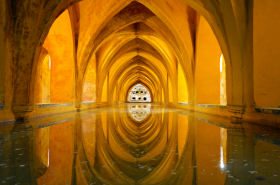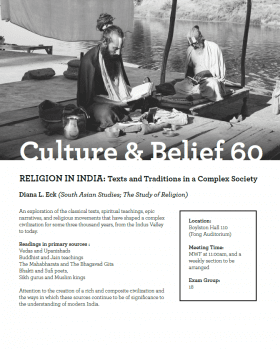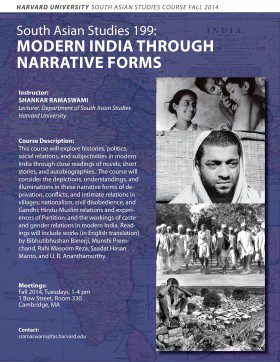Still looking for fall courses? Here are several to consider:
 Islamic Civilizations 178: Muslim Societies in South Asia: Religion, Culture, and Identity
Islamic Civilizations 178: Muslim Societies in South Asia: Religion, Culture, and Identity
Ali S. Asani, Professor of Indo-Muslim and Islamic Religion and Cultures; Director of the Prince Alwaleed Bin Talal Islamic Studies Program
For Undergraduates and Graduates
Half course (fall term). Th., 1-3 pm
South Asia is home to the largest concentration of Muslims in the world. This course surveys the development of Muslim communities in the region focusing on an exploration of their identities in diverse contexts. Issues and themes will be considered within religious and socio-political contexts, as well as the broader framework of South Asian cultures as expressed in language, literature, and the arts. The course also examines various ways in which the terms “Islamic” and “Muslim” are understood in pre-modern and modern discourses as well as the lived experiences of being Muslim in contemporary India, Pakistan, and Bangladesh.
 Culture and Belief 60. Religion in India: Texts and Traditions in a Complex Society
Culture and Belief 60. Religion in India: Texts and Traditions in a Complex Society
Diana L. Eck (South Asian Studies; The Study of Religion)
Half course (fall term). M., W., (F.), at 11, and a weekly section to be arranged. EXAM GROUP: 18
Location: Boylston Hall 110 (Fong Auditorium)
An exploration of the classical texts, spiritual teachings, epic narratives, and religious movements that have shaped a complex civilization for some three thousand years, from the Indus Valley to today. Attention to the creation of a rich and composite civilization and the ways in which these sources continue to be of significance to the understanding of modern India.
Readings in primary sources :
Vedas and Upanishads
Buddhist and Jain teachings
The Mahabharata and The Bhagavad Gita
Bhakti and Sufi poets,
Sikh gurus and Muslim kings
 South Asian Studies 199: Modern India Through Narrative Forms
South Asian Studies 199: Modern India Through Narrative Forms
Instructor: Shankar Ramaswami, Lecturer, Department of South Asian Studies
Email Address: sramaswami@fas.harvard.edu
Meetings: Fall 2014, Tuesdays, 1-4 pm
1 Bow Street, Room 330
This course will explore histories, politics, social relations, and subjectivities in modern India through close readings of novels, short stories, and autobiographies. The course will consider the depictions, understandings, and illuminations in these narrative forms of deprivation, conflicts, and intimate relations in villages; nationalism, civil disobedience, and Gandhi; Hindu-Muslim relations and experiences of Partition; and the workings of caste and gender relations in modern India. Readings will include works (in English translation) by Bibhutibhushan Banerji, Munshi Premchand, Saadat Hasan Manto, Rahi Masoom Reza, and U. R. Ananthamurthy.
